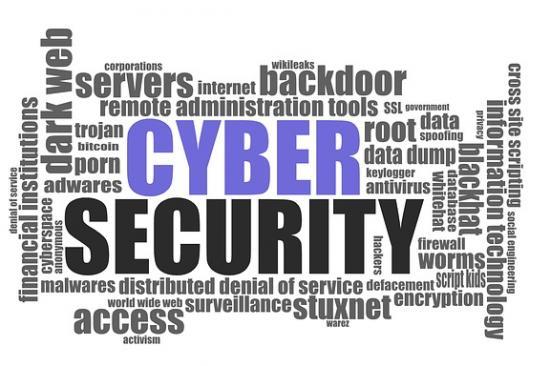Is Cyber Security Part Of Your Business Plan?
10th January 2018

The increasing use of digital services in a connected world brings an increasing threat of cyberattack. The Internet that connects systems doesn't discriminate between the type of traffic it allows on the network, it is our responsibility to manage this when we connect to and use the Internet by recognising and reducing the risk as appropriate. Attackers are constantly improving their ability to penetrate systems through social engineering and the opportunity of our increased online presence. The first step for an organisation to counter the threat from cyberattack is to understand their risks and to deal with the question of not "if" it will happen, but "when".
The consequence of a successful attack depends heavily on the nature and scale of the attack and the ability of the organisation to respond to it. Some attacks may result in complete failure of an organisation's systems; some may take money from bank accounts or credit cards; some may compromise data; and some may impact on an organisation's reputation. It is important to remember that not all attacks come through the computer systems, successful telephone based vishing attacks are being seen in ever increasing quantities to demonstrate that our ability to detect them does not depend on computer based security systems.
The majority of cyberattacks are not targeted at specific individuals or organisations but are opportunistic and look to exploit known vulnerabilities in computer systems that can be exploited. Cyber attackers, hackers and writers of malware use programs that are able to automatically exploit known weaknesses, poorly configured systems and weak passwords without consideration of the impact that it will have on the target.
Organisations should not look on the cyber security threat as being a technology problem, it is an organisational risk as it is the organisation that will be disrupted and it should be addressed at this level. Whilst technology is a natural part of the process to secure the organisation, most of the changes that are required in the attitude of employees to the risk and the management of the risk. Security needs to be an integral part of the business process, technology can assist in the implementation and management of the process but it can't fully protect it.
There are some practical and basic steps that individuals and organisations should take in order to better protect themselves:
Do not share passwords between employees or on different services/applications, preventing multiple systems being compromised if one username and password is obtained.
Robust passwords provide one of the first lines of defence against attack and we should think about pass-phrases rather than passwords when choosing our passwords. Policies on password management vary from one organisation to another with some demanding passwords have a minimum length, a mixture of numbers, letters and special characters and that needing to be changed frequently. Consider using passwords that are 12 or more characters long that are based on three or four unrelated words that are punctuated by numbers and characters, e.g. Blue1Fish.Moon.
An organisational password policy indicates that the issue is taken seriously and provide guidelines to employees and users on password selection and management. Consider using one of the many available password managers to make the management of passwords within the organisation easier and secure for everyone as user should be using more than the typical five to six unique passwords.
Regularly educate users on the various attacks vectors that are used, this should include email, social media and the use of social profiling. Deliver regular training sessions to ensure that users are aware of the current techniques being used and consider carryout tests on the systems and users through carryout ethical penetration tests to see how effective this training is.
Restrict access to data to only those that require it
The security threat is not static and neither should the system resilience, to assist in maintaining resilience within the business systems:
Ensure that all systems are properly configured so that only authorised and restricted users have management/administrative rights and that they are only used when needed.
Ensure that system updates and patches are applied promptly after being released.
Install commercial grade anti-virus software and keep it up to date.
Review systems to ensure that they are compliant and manage change to ensure that the system resilience is maintained.
Take regular system and data backups and ensure that the organisation can recover with acceptable data loss.
Implement a recovery plan to ensure that the organisation can get back to the required operational level within an acceptable timeframe.
To assist with this, the National Cyber Security Centre has produced a 10 Steps to Cyber Security resource at https://www.ncsc.gov.uk/guidance/10-steps-cyber-security.
The Cyber Essentials scheme has been developed by Government and industry to fulfil two functions. It provides a clear statement of the basic controls all organisations should implement to mitigate the risk from common internet based threats, within the context of the Government’s 10 Steps to Cyber Security. And through the Assurance Framework it offers a mechanism for organisations to demonstrate to customers, investors, insurers and others that they have taken these essential precautions.
Cyber Essentials offers a sound foundation of basic hygiene measures that all types of organisations can implement and potentially build upon. Government believes that implementing these measures can significantly reduce an organisation's vulnerability. However, it does not offer a silver bullet to remove all cyber security risk; for example, it is not designed to address more advanced, targeted attacks and hence organisations facing these threats will need to implement additional measures as part of their security strategy. What Cyber Essentials does do is define a focused set of controls which will provide cost effective, basic cyber security for organisations of all sizes.
The Assurance Framework, leading to the awarding of Cyber Essentials and Cyber Essentials Plus certificates for organisations, has been designed in consultation with SMEs to be light-touch and achievable at low cost. The two options give organisations a choice over the level of assurance they wish to gain and the cost of doing so. It is important to recognise that certification only provides a snapshot of the cyber security practices of the organisation at the time of assessment, while maintaining a robust cyber security stance requires additional measures such as a sound risk management approach, as well as on-going updates to the Cyber Essentials control themes, such as patching. But we believe this scheme offers the right balance between providing additional assurance of an organisation’s commitment to implementing cyber security to third parties, while retaining a simple and low cost mechanism for doing so. The Scottish Business Resilience Centre maintains a list of organisation that can assist organisations to achieve Cyber Essentials at: https://www.sbrcentre.co.uk/services/cyber-services/cisp-and-cyber-essentials/approved-practitioners/
https://www.sbrcentre.co.uk/services/cyber-services/cisp-and-cyber-essentials/trusted-partners/
HIE is currently working with a range of its clients across the region who are working towards their Cyber Essentials accreditation. This has been running since September and included a one day intensive workshop and 1-2-1 support from a digital adviser to develop a Cyber Resilience plan. Any account managed organisations or businesses interested in this programme should contact their account manager or can email hidigital@hient.co.uk
Computer Security is a vast topic and more information can be read at https://en.wikipedia.org/wiki/Computer_security
Related Businesses
Related Articles
Workforce North event spotlights Highland economy
EMPLOYERS and educators from across the Highlands have gathered to hear how a new initiative is aiming to transform the region's economy. Workforce North - A Call to Action brought together business leaders and teachers from primary and secondary schools from across the Highland Council area with a wide range of partners geared towards education, learning and skills development at Strathpeffer Pavillion.
Tartan challenge for UHI students offers £1,500 prize
Students from across the University of the Highlands and Islands (UHI) partnership have been challenged to design a tartan and be in with a chance of winning a £1,500 cash prize. Highlands and Islands Enterprise (HIE) has launched THE COMPETITION to mark 60 years since the regional development agency (then named Highlands and Islands Development Board) was established in November 1965.
The Rural AI Roadshow - How AI can help your rural business thrive
Scotland's enterprise agencies (Scottish Enterprise, Highlands and Islands Enterprise, South of Scotland Enterprise) The Scottish AI Alliance and The Data Lab have joined forces to plan and deliver an inspiring and educational Rural AI Roadshow. There will be three, one day, Rural AI Roadshow conferences taking place across Scotland in January 2026.
Digital and AI innovation round-up for November
Scotland's digital future is accelerating, with AI and tech innovation transforming businesses. In this blog, HIE's Theresa Swayne shares November insights on funding, leadership, and how organisations can harness technology to stay ahead.
Reflections from SEWF Rural: global lessons for the Highlands and Islands social impact economy
As we mark 60 years since the region's economic and community development agency was established, it's timely to reflect on the global aspects of our work on shaping rural futures. The recent Social Enterprise World Forum (SEWF) Rural Gathering in Sabah, Malaysia, welcomed changemakers from Australia, Ireland, India, Canada.
Scottish Entrepreneurial Ecosystem Guide - FREE To Download
Scottish Enterprise's Entrepreneurial Ecosystem Guide provides an overview of more than 150 organisations that support new and growing companies in Scotland. The guide includes incubators, accelerators, specialist industry programmes, co-working spaces and networking organisations.
Funding approved for Wick Harbour port consultant
A specialist ports consultant has been appointed to develop a long-term strategic plan for Wick Harbour Authority (WHA) in Caithness. WHA has secured £47,775 from Highlands and Islands Enterprise (HIE) and the Nuclear Restoration Services, NRS Dounreay towards the cost of the services.
Enterprise and innovation agencies join forces in new framework
Scotland's three enterprise agencies have joined the UK's national innovation agency to agree a collaboration framework that aims to help Scotland become one of the most innovative small nations in the world. The Innovation Collaboration Framework for Scotland brings together Highlands and Islands Enterprise, Scottish Enterprise, South of Scotland Enterprise and Innovate UK with a commitment to support ambitious businesses to invest in research to drive economic growth, create good jobs and help tackle major societal and environmental challenges.
£3.4m HIE investment in Arnish Road, Stornoway
The project, led by the Stornoway Port Authority, will involve upgrading the full length of the 3.3km Arnish Moor Road. Highlands and Islands Enterprise (HIE) has approved a £3.4m contribution to a £7.2m public funding package for a major project to transform road access to strategic industrial and port sites on the Isle of Lewis.
As HIE reaches 60, new chair says best is yet to come
The newly appointed chair of Highlands and Islands Enterprise (HIE) says the region is on the threshold of a new era of economic growth. Angus Campbell's term as chair began officially on 1 November - 60 years to the day since HIE's forerunner, the Highlands and Islands Development Board (HIDB) opened for business with just six employees.
